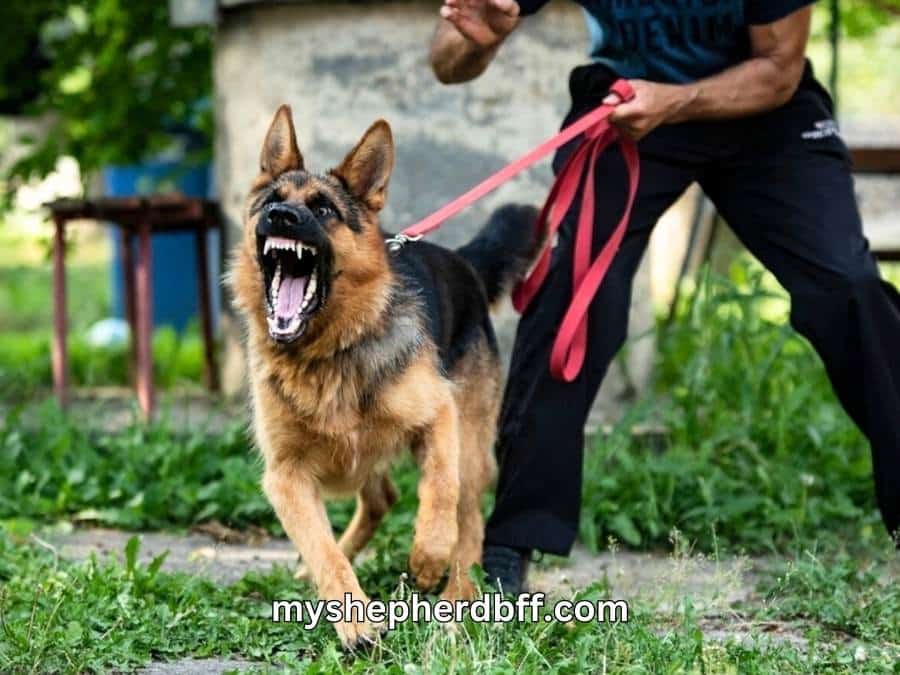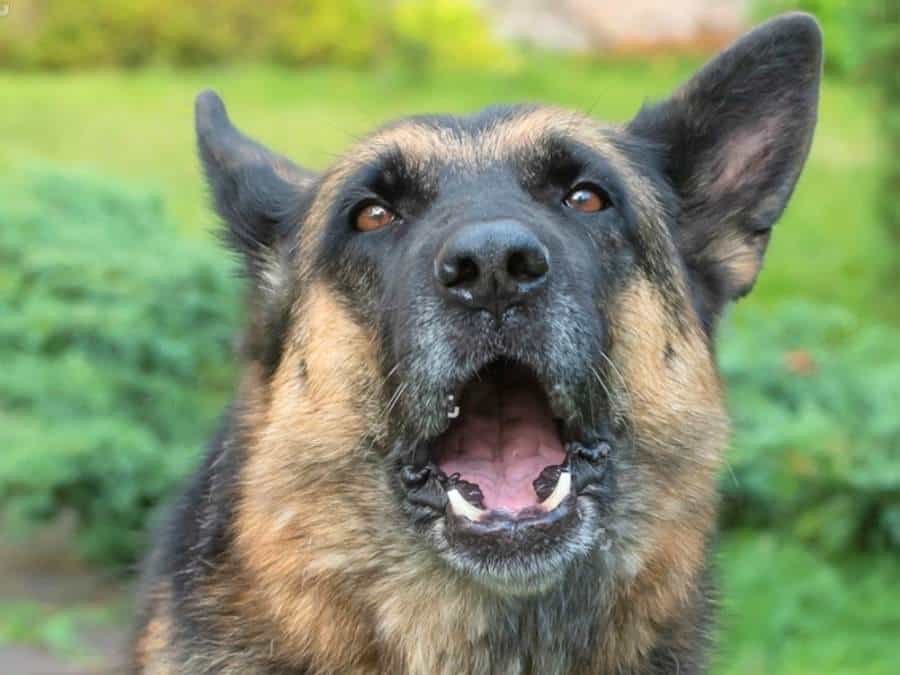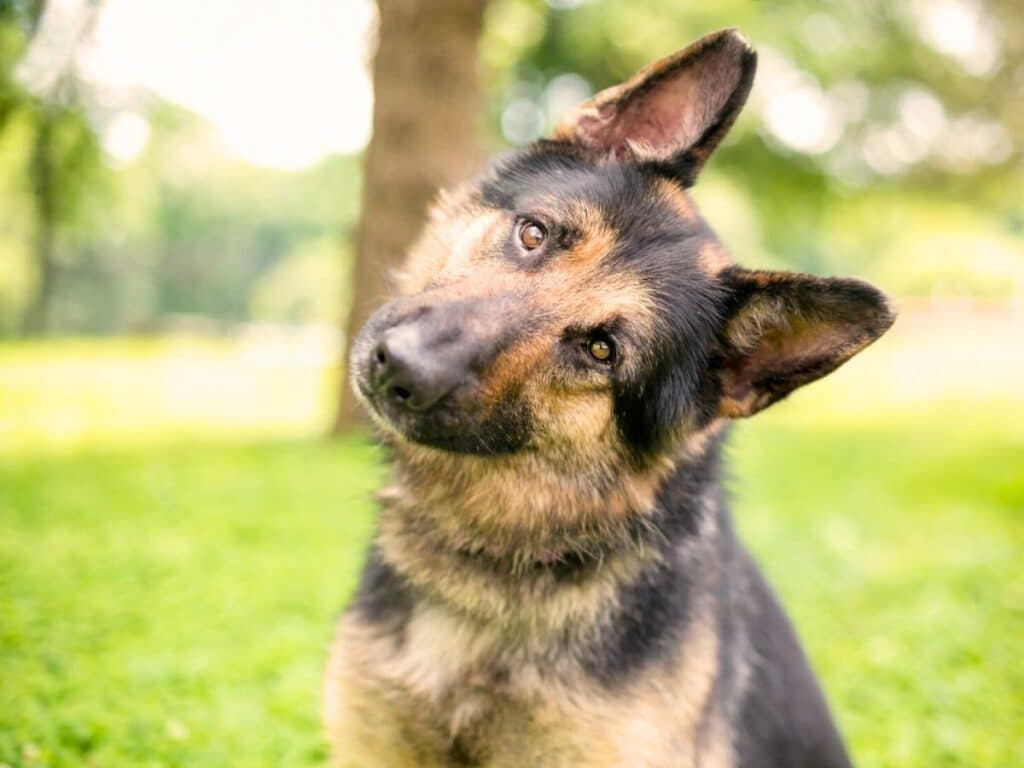Can a German Shepherd Kill You? Well, owning a German Shepherd comes with its fair share of risks. These dogs are known for their incredible strength and protective instincts.
But just how dangerous can they be? Are they capable of inflicting harm that could lead to something as extreme as death? This is the perplexing query we aim to answer today.
Can a German Shepherd Kill a Human?
Yes, a German Shepherd or any other large and powerful dog breed has the potential to seriously injure or, in extreme cases, kill a human. However, such incidents are rare and often result from factors like inadequate training, lack of socialization, or provocation.
In the year 2022, dogs were responsible for 63 deaths in the US. Among these cases, four fatalities were attributed to the German Shepherd breed and Pitbulls accounted for 42 deaths. (Source)
DogsBite.org compiled a 13-year fatality report identifying breeds of dogs involved in U.S. attacks from 2005 to 2017.

As can be seen from the infographic above, the Pit Bull is still the breed/type of dog responsible for the most fatal attacks with 284 incidents identified, 66 percent of the total.
The Rottweiler comes a distant second with 45 fatal attacks over those 13 years while the German Shepherd is third with 20.
So as you can see, while most German Shepherds are not aggressive towards humans by nature, there have been instances where fatalities have occurred. These tragic incidents often involve specific circumstances that contribute to the outcome.
One example is when individuals provoke or mistreat these animals. Dogs can react aggressively if they feel threatened or if they perceive their owners or themselves to be in danger.
Poor socialization during puppyhood or inadequate training can lead to behavioral issues that may escalate into dangerous situations.
Another scenario where fatalities involving German Shepherds have occurred is when inexperienced owners fail to recognize signs of aggression or neglect proper control measures.
Are German Shepherds Dangerous?
German Shepherds, like any dog breed, can potentially pose a danger if not properly trained, socialized, or managed. Their natural protective instincts and strength can become problematic if these traits are not channeled correctly. However, when raised in a responsible and caring environment, with appropriate training and socialization, GSDs are often loyal, intelligent, and reliable companions.

It is also important to understand that these dogs possess the physical capabilities to cause serious harm if not properly trained or handled.
1. Strong jaws capable of causing serious injuries
These dogs have a strong bite force of 238 PSI that can exert significant pressure, which can result in severe injuries. Their teeth are sharp and designed for tearing through flesh, making them capable of inflicting deep wounds.
In instances where a German Shepherd feels threatened or provoked, they may resort to biting as a means of defending themselves or their owners.
RELATED: Why Are German Shepherds Used As Police Dogs?
2. Size and strength leading to significant physical harm
GSDs are considered large breed animals with well-developed muscles. If a German Shepherd lunges at an individual or knocks them over with its sheer force, it can result in broken bones, concussions, or other severe injuries.
The weight behind their movements combined with the power they possess makes it crucial for owners to have control over these dogs through obedience training and responsible handling.
3. Protective instincts resulting in aggressive behavior
While German Shepherd’s protective instincts make them excellent guard dogs when properly trained, it also means that they may display aggression towards perceived threats. This can include strangers, other animals, or even individuals they perceive as potential dangers.
If a German Shepherd feels that it needs to protect its territory or loved ones, it may exhibit aggressive behavior such as growling, barking, or attacking.
RELATED: Are German Shepherds Dangerous?
Will a German Shepherd Attack Its Owner?
In general, a well-bred, properly trained, and socialized German Shepherd is unlikely to attack its owner. GSDs are known for their loyalty and strong bond with their families. However, any dog can potentially exhibit aggressive behavior if they feel threatened, scared, or provoked, or if they have not been properly trained or socialized.

One crucial factor in preventing aggression from German Shepherds towards their owners is proper training. These dogs thrive on structure and clear boundaries, so it’s essential to establish a consistent routine from an early age.
Socialization is another vital aspect of raising a well-adjusted German Shepherd. Exposing them to various people, animals, sounds, and environments at a young age helps them develop confidence and reduces the likelihood of fear-based aggression later in life.
RELATED: Are German Shepherds Good With Cats?
Why Do German Shepherds Attack Their Owners
German Shepherds, like any dog breed, might exhibit aggressive behavior towards their owners for various reasons:
1. Fear or anxiety
When a German Shepherd perceives a threat, whether real or imagined, it may resort to defensive behaviors such as growling, barking, lunging, or even biting. This response is often triggered by fear and the instinct to protect themselves and their owners from potential harm.
RELATED: Do German Shepherds Bark a Lot?
2. Lack of proper training and socialization
These intelligent dogs require consistent training from an early age to learn appropriate behavior and understand boundaries. Without adequate training, they may struggle with impulse control and exhibit aggressive tendencies.
RELATED: Are German Shepherds Easy To Train?
Also, when German Shepherds are not exposed to various environments, people, and situations during their critical socialization period (between 3 weeks and 14 weeks old), they may become anxious or fearful when faced with unfamiliar stimuli later on in life.

3. Medical issues
Physical discomfort or underlying health problems can trigger sudden changes in behavior, causing a dog to become irritable and potentially aggressive.
4. Miscommunication
Dogs communicate through body language and cues. Misinterpreting their signals or sending mixed signals can lead to confusion and aggressive reactions.
5. Past trauma or abuse
Dogs with a history of abuse or traumatic experiences may display aggressive behaviors as a result of their past experiences.
6. Dominance issues
Dogs may display aggression if they perceive themselves as dominant and challenge their owners’ authority.
RELATED:
How Can You Tell When a GSD Is About to Attack?

It’s important to be able to recognize the warning signs of aggression. These dogs are known for their loyalty and intelligence, but just like any other breed, they have the potential to become aggressive under certain circumstances.
Recognizing signs that a German Shepherd might be about to attack is crucial for preventing potential harm. Some indicators include:
- Intense Staring: If the dog fixes its gaze on a target, with a rigid body posture, it might be preparing to act aggressively.
- Raised Hackles: When the fur along the dog’s back stands on end, it can signal heightened alertness and potential aggression.
- Freezing: If the dog suddenly stops moving or holds a rigid stance, it might be preparing to lunge or attack.
- Growling or Snarling: Audible warning signals like growling or snarling indicate the dog’s discomfort and its readiness to escalate.
- Showing Teeth: Baring teeth, especially when combined with other warning signs, suggests an imminent threat.
- Tense Body: A stiff and tense body, often seen with the tail raised, can indicate heightened aggression.
- Ears Forward: When ears are forward and focused, it shows the dog’s attention and potential readiness to engage.
- Aggressive Barking: Rapid, aggressive barking with a harsh tone can be a precursor to an attack.
- Lowered Head: A lowered head combined with other signs may signal the dog is about to charge.
- Raised Tail: An erect tail, especially when accompanied by other aggressive behaviors, can indicate the dog’s readiness to attack.
- Quick Movements: Sudden, jerky movements can indicate the dog is on edge and might attack.
It’s important to remember that not all dogs will exhibit the same set of behaviors before attacking. If you sense any combination of these signs or feel unsafe around a German Shepherd, it’s essential to slowly and calmly back away without making sudden movements or direct eye contact.
What to Do When Your GSD Becomes Aggressive

When faced with an aggressive German Shepherd Dog (GSD), it is crucial to prioritize your safety above all else. These powerful and intelligent dogs have the potential to cause harm, so it’s essential to know how to handle such situations. Here are some immediate steps you can take:
- Stay calm: It’s natural to feel scared or anxious when confronted by an aggressive dog, but try your best to remain calm. Dogs can sense fear, which may escalate their aggression further.
- Don’t run: Running can trigger the dog’s instinct to chase and escalate the situation.
- Avoid direct eye contact: Staring directly into the eyes of an aggressive GSD can be seen as a challenge or threat. Instead, keep your gaze soft and avert your eyes slightly.
- Speak softly: In a calm and soothing voice, gently encourage the dog to calm down.
- Do not turn your back on the dog: Turning away from an aggressive GSD can trigger their prey drive, potentially leading to a more dangerous situation. Maintain a facing position while keeping yourself as still as possible.
- Put objects between you and the dog: If available, use items such as bags, umbrellas, or even bicycles as barriers between you and the aggressive dog. This may help create distance and provide some protection.
- Limit provocations: Reduce stimuli that might be causing aggression, such as loud noises or crowding.
- Back away slowly: While avoiding eye contact, slowly move away from the dog without sudden movements or running. Retreating calmly allows you to disengage from the situation without provoking further aggression.
Can a German Shepherd Knock You Down?

Yes, a German Shepherd has the potential to knock a person down, especially if the dog is large, strong, and excited. German Shepherds are known for their powerful build and agility. If they jump, lunge, or run towards a person with force, they can easily knock someone off balance, leading to a fall.
This is particularly true if the person is not prepared for the dog’s sudden movement.
To avoid being knocked down by a German Shepherd, it’s important to maintain a balanced stance and use the tips mentioned earlier for handling situations involving an approaching dog.
Staying calm, avoiding sudden movements, and using objects to create a barrier can help you stay on your feet and prevent accidents.
What to do when a GSD knocks you down?
If a German Shepherd knocks you down, follow these steps to stay safe and handle the situation:
- Protect your head and neck: As you fall, try to tuck your chin to your chest and turn your face away to protect your head and neck from impact.
- Remain still: Stay as still as possible to avoid startling or further exciting the dog.
- Curl into a ball: If the dog continues to be excited, curl into a fetal position, protecting your vital areas and face.
- Avoid eye contact: Averting your gaze can help minimize any perceived threat.
- Speak calmly: In a soft and soothing tone, speak to the dog calmly to signal that you are not a threat.
- Don’t make sudden movements: Sudden movements might trigger the dog’s instinct to play or engage more vigorously.
- Wait for the dog to settle: If the dog’s excitement wanes and it moves away, slowly and carefully get up when you feel safe to do so.
After the incident, consider reporting the situation to the dog’s owner or local animal control if the dog was off-leash or acting aggressively. If you frequently encounter unleashed or aggressive dogs in your area, it’s a good idea to carry a personal alarm or whistle to deter dogs from approaching you.
How To Stop Your German Shepherd From Biting

To stop your German Shepherd from biting, follow these steps to address the behavior and encourage positive interactions:
- Puppy teething phase: Understand that puppies go through a teething phase where they explore the world with their mouths. Provide appropriate chew toys to redirect their biting instinct.
- Socialization: Socialize your German Shepherd from a young age, exposing them to various people, dogs, and environments. This helps reduce fear-based aggression.
- Obedience training: Enroll your dog in basic obedience classes to establish clear communication and commands like “sit,” “stay,” and “leave it.”
- Use positive reinforcement: Reward your dog with treats, praise, and affection when they exhibit good behavior, such as not biting.
- Redirect biting: When your dog starts to bite, redirect their attention to a toy or chew treat that is appropriate to bite.
- Provide mental and physical stimulation: A tired dog is less likely to engage in unwanted behavior. Engage them in physical activities and mental challenges to keep them occupied.
- Avoid rough play: Discourage games that involve rough play, as they can encourage biting behavior.
- Teach bite inhibition: When your dog bites during play, yelp loudly to mimic a puppy’s reaction. If they continue to bite, end the play session briefly. This teaches them to control the force of their bites.
- Teach “Off” command: Train your dog to understand the command “off” to stop them from jumping or biting.
- Avoid punishment: Avoid physical punishment or scolding, as this can lead to fear or aggression.
- Consult a professional: If your German Shepherd’s biting behavior persists or becomes aggressive, seek guidance from a certified dog trainer or behaviorist.
- Health check: Sometimes, pain or discomfort can lead to biting. Ensure your dog is healthy and free from any medical issues.
Consistency, patience, and positive reinforcement are key to stopping biting behavior in your German Shepherd. Tailor your approach to your dog’s personality and needs, and remember that it’s a gradual process that requires ongoing training and attention.
What Happens If a German Shepherd Bites You?

If a German Shepherd bites you, the severity of the outcome depends on various factors, including the dog’s intent, the force of the bite, the location of the bite, and your response. Here’s what might happen:
- Minor bite: A minor bite might result in a superficial scratch or small puncture wound that doesn’t cause significant harm. It could still lead to pain, discomfort, and a risk of infection.
- Moderate bite: A moderate bite could cause deeper puncture wounds and potentially damage to tissues, muscles, or tendons. You might experience more pain, bleeding, and a higher risk of infection.
- Severe bite: A severe bite could lead to extensive tissue damage, fractures, and potentially life-threatening injuries. Immediate medical attention is crucial in such cases.
- Infection risk: Any dog bite, regardless of severity, carries the risk of infection. Dogs’ mouths contain bacteria that can lead to infections if not properly cleaned and treated.
- Legal consequences: If the bite occurs due to negligence or aggressive behavior on the dog owner’s part, there might be legal implications.
What should you do if bitten by a German Shepherd?
If you or someone around you has been bitten by a German Shepherd or any dog, please follow these steps:
- Clean the wound: Wash the wound with soap and water to reduce the risk of infection. Apply an antiseptic and cover it with a clean bandage.
- Seek medical attention: Regardless of the severity, it’s important to consult a healthcare professional, especially if the bite is deep or there’s a risk of infection.
- Report the incident: If the dog isn’t yours or is acting aggressively, report the incident to local animal control to ensure public safety.
- Dog owner Information: If the dog’s owner is present, obtain their contact information in case of medical or legal concerns.
- Document the incident: Take photos of the bite and the dog, if possible, for documentation purposes.
- Consider rabies vaccination: Depending on the circumstances, you may need a rabies vaccination.
Remember that each dog bite situation is unique, and the priority is your safety and well-being. Always seek medical attention for proper evaluation and treatment, regardless of the bite’s severity.
Conclusion
So, can a German Shepherd kill you? Well, German Shepherds are powerful dogs with strong jaws, and if they attack, they can cause serious injuries. Their bites can lead to deep wounds, broken bones, and severe tissue damage. While fatalities from German Shepherd attacks are rare, it is crucial to take any encounter seriously and prioritize your safety.
While German Shepherds are typically loyal and protective dogs, they have the potential to cause harm if they feel threatened or become aggressive. Understanding their behavior and taking appropriate measures can help prevent any dangerous incidents.
Frequently Asked Questions (FAQs)
1. Do German Shepherds bite hard?
Yes, German Shepherds have powerful jaws and can bite with a strong bite force of 238 PSI. The intensity of their bite can vary based on factors such as their individual temperament, training, and the situation.
2. Can a German Shepherd break your arm with a bite?
Yes, a German Shepherd has the potential to break a person’s arm with a strong bite, especially if the force is significant and the bite is applied in a vulnerable area.
3. Will a German Shepherd attack an intruder?
Yes, a German Shepherd can potentially attack an intruder if it perceives a threat to its territory or family. Their protective instincts and training can lead them to take action to defend their home and loved ones.




